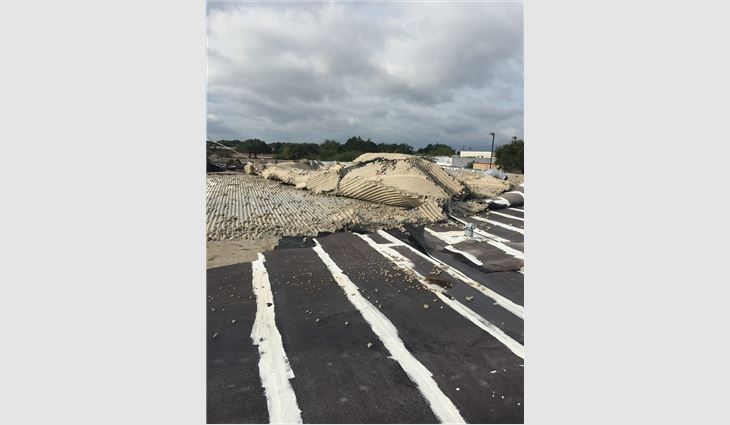 Photo courtesy of R. B. Hash and Associates Inc., Houston.
Photo courtesy of R. B. Hash and Associates Inc., Houston.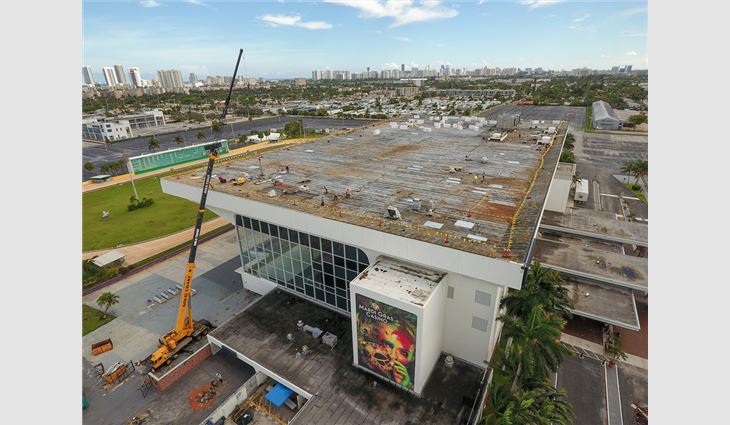 Photo courtesy of Advanced Roofing Inc., Fort Lauderdale, Fla.
Photo courtesy of Advanced Roofing Inc., Fort Lauderdale, Fla.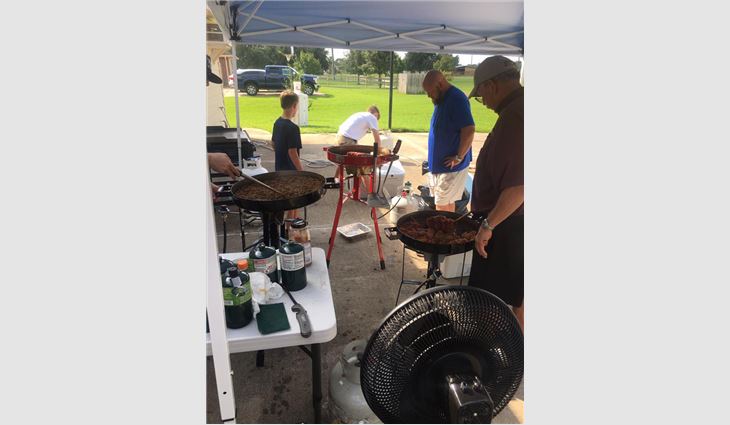 Photo courtesy of Chris Jackson, general manager for Beldon Roofing Co., Houston.
Photo courtesy of Chris Jackson, general manager for Beldon Roofing Co., Houston.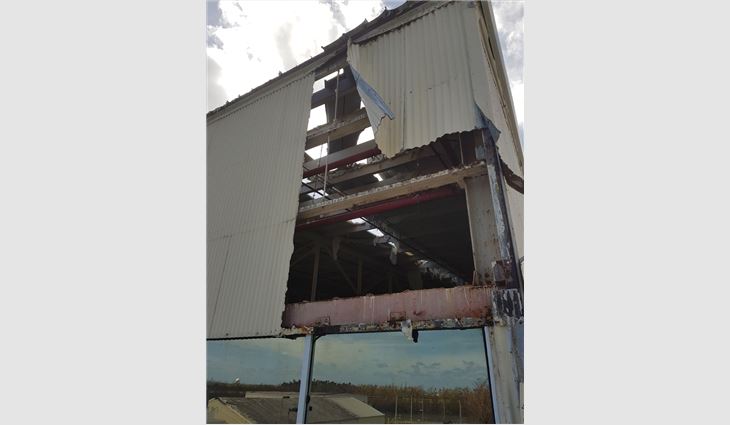 Photo courtesy of Overall Contractors Group Inc., Caguas, Puerto Rico.
Photo courtesy of Overall Contractors Group Inc., Caguas, Puerto Rico.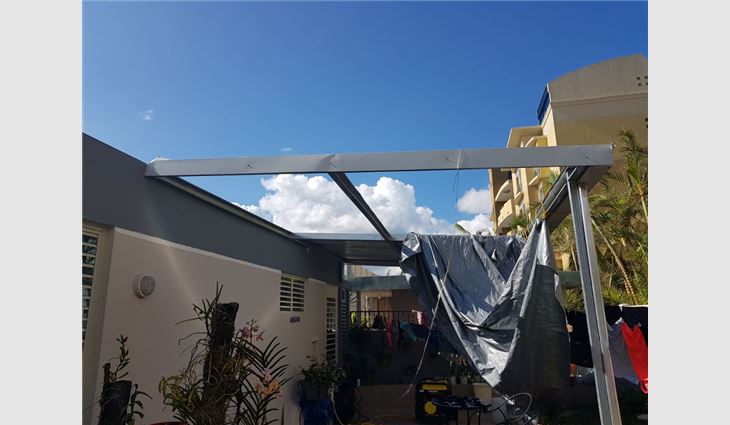 Photo courtesy of Overall Contractors Group Inc., Caguas, Puerto Rico.
Photo courtesy of Overall Contractors Group Inc., Caguas, Puerto Rico.Harvey, Irma and Maria are names many people will never forget. Experts at Bloomberg Businessweek project costs incurred from the 2017 hurricane season will exceed $200 billion—the costliest season in U.S. history. Many Texans remain homeless, and more than 73,000 people have fled devastated Puerto Rico to rebuild their lives in Florida, according to NBCU News Group.
Immediately following the hurricanes, NRCA staff checked in with members to see how they fared after the storms and offer support. True to form, roofing professionals met Mother Nature's challenges with determination and hope.
Hurricane Harvey
Hurricane Harvey was a Category 4 storm that reached Texas Aug. 25, 2017, and killed 82 people, according to The Washington Post. It caused more than $180 billion in damage—the second costliest natural disaster in U.S. history, following Hurricane Katrina, according to CNN Money.
Hurricane Harvey made landfall three times in six days. At its peak Sept. 1, one-third of Houston was underwater. Two feet of rain fell in 24 hours, forcing 39,000 people out of their homes and into shelters.
"R. B. Hash closed for two days during Hurricane Harvey's aftermath," says Lynne Marie Hash, marketing director for R. B. Hash and Associates Inc., Houston. "Several employees were out of the office additional days, depending on their location, but thankfully none of our employees experienced flooding in their homes—only minor issues."
In preparation for the impending storm, the company took precautionary measures, such as relocating electronics to higher storage areas to avoid flood damage. Fortunately, R. B. Hash and Associates' facility did not sustain major damage, allowing employees to be fully committed to helping others.
"Our employees were willing to help wherever they could," Hash says. "We helped as many customers as possible and as quickly as possible with the resources at hand. We also purchased an additional service vehicle to help navigate repair requests."
Several employees also volunteered to help with demolition work at clients' and friends' houses. As a result of flooded roads, the company experienced major commuting delays but eventually returned to typical response times.
"It took about a month for operations to be up and running normally," Hash says. "In addition, the influx of service requests caused a backlog; our response time is just getting back to an even keel."
Although R. B. Hash and Associates employees escaped Hurricane Harvey with only minor damage, Sandy Farrell, former president of Farrell Roofing & Sheet Metal Co., Houston, was not so fortunate.
"I had just got my house repaired after getting 24 inches of rain over Memorial Day weekend in 2016," Farrell says. "And then Harvey hit, and I got another 38 inches."
Farrell also has three rental properties that flooded with about 8 inches of rainwater.
"At least my house was insured this time, but I'm not as lucky with the rentals," she says. "I just got my FEMA inspection, so I hope I'll be able to get started again on renovations soon."
Unfortunately, hundreds of people are in the same predicament as Farrell. To assist its community with Hurricane Harvey relief, San Antonio-based Beldon Roofing Co. deployed about 50 team members to Houston, where they stayed for about a month to assist with roof repairs. In addition, Chris Jackson, general manager for Beldon Roofing's Houston office, prepared thousands of meals for first responders.
"I'm a member of Lone Star Smoke Syndicate, a local cooking competition group, and we thought we might as well put our talents to use," Jackson says. "We called around to churches and schools to offer help with food and then people started contacting us and it just blew up."
During the week of Aug. 28 immediately following Hurricane Harvey, Jackson helped cook breakfast, lunch and dinner for members of the National Guard and other first responders in the area. An idea to help others turned into an around-the-clock relief effort where between 20 and 30 people were simultaneously cooking food to keep up with the demand. During the weeklong effort, more than 12,000 meals were cooked, prepared and provided to people in the area.
"As word spread, we started receiving food from all over and would hand out supplies, such as granola bars, to police officers who were rescuing people by boat," Jackson says. "One guy even bought a boat on his way down and started rescuing people. We had an overwhelming sense of giving back."
To help fund their efforts, the group set up a GoFundMe® account and raised $35,000, of which about $20,000 went toward food and supplies for the week. A check for the fundraising account's $15,000 balance then was presented to Behind the Badge Charities, a local nonprofit organization for public safety employees.
"Once I get involved, I give as much as I can give," Jackson explains. "I would leave the house around 5 a.m. and wouldn't get home until after 1 a.m. Being part of something where everybody put all their differences aside was a profound experience, and I'll never forget it."
Hurricane Irma
Twelve days after Hurricane Harvey struck Texas, Hurricane Irma made landfall in Barbuda. Hurricane Irma sustained 185 mph winds for 37 hours, making it "the longest any cyclone around the globe has maintained that intensity on record," according to Phil Klotzbach, a research scientist at Colorado State University, Fort Collins. According to NASA, the coastal storm's surges were 20 feet above normal tide levels and held 7 trillion watts of energy.
After leaving Barbuda "barely inhabitable," according to Winston Baldwin Spencer, prime minister of Antigua and Barbuda, Hurricane Irma left hundreds of people in Puerto Rico without power before reaching Florida's Key West, Naples and Miami. The Florida Keys received 12 inches of rain before Irma was downgraded to a Category 1 hurricane as it headed to Tampa, where 6 million people lost electricity before the storm was downgraded to a tropical storm.
"Our building lost power for five days. As a result of knowledge gained during the 2004-05 hurricanes, we installed a huge generator that powers our servers, sheet metal shop equipment, air conditioner, and gas and diesel pumps," says Doug Sutter, president of Sutter Roofing Co., Tampa. "We did not miss a beat!"
Before the storm, Sutter Roofing employees off-loaded material from its job sites; secured tie-ins at active, incomplete work sites; cleaned up the company's yard; gassed up the trucks; and "hoped for the best." Organized planning allowed the company to remain operational during a power outage, but some employees missed a couple of days of work to tend to their own properties.
"A couple of our employees' homes were badly flooded and most had trees down," Sutter says. "We take care of our employees first before anyone else because they can't come to work with a clear mind when they know they have damage and issues at home. We want our crews working safely, knowing things are handled at home before they come back to work."
In addition to helping its employees and customers recover after the storm, Sutter Roofing workers helped "dry in" a Children First Center's facility and will be installing a discounted new roof system on the building in conjunction with Firestone Building Products Co. LLC, Nashville, Tenn., later this year.
In Fort Lauderdale, a few hundred miles southeast of Tampa, the Advanced Roofing Inc. team has been meeting every March since 1983 to fine-tune its emergency disaster preparedness plan. When news of the impending hurricane reached the area, the company set its plan into action, including securing job-site materials, backing up data, covering windows, emailing customers with emergency contact information, servicing the generator and stockpiling fuel for two weeks.
"We had no major damage, but we lost power for five days," says Michael Kornahrens, vice president of Advanced Roofing. "So we used a backup generator to power operations. It was a critical piece of equipment to have and allowed us to not lose any production days post-storm."
In addition to helping customers recover from the storm, workers assisted with recovery efforts at Sonrise Mission, a faith-based rehabilitation center, and donated supplies to the Florida Keys, where Jim Loftus, Advanced Roofing's service manager, traveled via boat to lend a hand.
"We brought generators, food, ice, chain saws, rigs, shovels, you name it," Loftus says. "In the grand scheme of things, we all belong to the same area. We're all Floridians, and we've got to stick together."
Hurricane Maria
While hurricanes Harvey and Irma were making headlines and less than two weeks after Hurricane Irma wreaked havoc in Florida, Hurricane Maria barreled through Puerto Rico as a Category 4 hurricane with winds up to 155 mph, making it the third-strongest storm to make landfall in the U.S. or its territories, according to World Vision. Before Hurricane Irma, only four other Category 4 storms had tracked within 75 miles of the central part of the island.
Hurricane Maria left at least 64 people dead, according to ABC News, knocked out a majority of Puerto Rico's electricity, destroyed all weather-monitoring systems and closed the airports for two weeks. Hospitals and public buildings remain badly damaged, and there is a lack of temporary housing, resulting in thousands of people fleeing to Florida. The island's entire population of 3.1 million people has been affected by Hurricane Maria.
"Nobody in Puerto Rico has ever seen anything like it," says Carmen Cruz, administrative assistant to the president, Overall Contractors Group Inc., Caguas, Puerto Rico. "It was catastrophic."
Despite widespread devastation in Puerto Rico, Overall Contractors Group only was closed for two days—the day Hurricane Maria struck Puerto Rico, Wednesday, Sept. 20, and the day after. Cruz says having an emergency disaster plan in place is what allowed her company's operations to return so quickly.
"Our president was not on the island when the hurricane hit," she says. "But because our company has written emergency protocols, we were able to assist our customers after the hurricane."
On Friday, Sept. 22, when the company resumed business, most of the island did not have electricity. Workers helped clients with emergency work while the office staff moved its operations to a temporary office location with a power generator in San Juan.
"We had to move the office operations because we needed to connect to the internet to continue communications with our customers and suppliers," Cruz says. "Telecommunication was our main concern because everything was down."
For two months, the company rented space with electricity, water and internet service. Overall Contractors Group's main facility only received minor damage, so workers were able to continue operations out of the warehouse. On Nov. 27, electricity was restored to the area.
"We've made a lot of progress during the past two months, but the telecommunications continue to be a great concern," Cruz says. "Most of the areas where our project sites are located are back to normal, but we know that particularly the municipalities in the center of the island had total devastation and they haven't yet been able to recover."
Although parts of Puerto Rico have come a long way in recovery efforts, many areas remain devastated and are in a holding pattern.
"On one hand, we have a lot of work to do because the roofing sector has been quite affected and it's our company's primary line of service," Cruz says. "But on the other hand, we have projects on hold until the municipality center can be restored, which is something we cannot predict right now."
Restoring Puerto Rico's municipality center is key to full island restoration. One of Overall Contractors Group's projects on hold is the U.S. Department of Labor's Job Corps Center. Cruz says once operations are up and running, they will hold an internal meeting to discuss when work can resume.
"Most people are saying a majority of construction activity will resume to normal conditions by the end of summer 2018," Cruz says. "But that is when the next hurricane season begins, so we'll see."
Until then, Overall Contractors Group remains "kind of busy" working on the roof repairs its employees can get to and painting buildings.
"It is so sad because so many people love their lives in Puerto Rico, and they are devastated," Cruz says. "But we continue moving forward because that is the only way we're going to recover ourselves and our island. We are blessed."
Hope in turmoil
As Texas, Florida and Puerto Rico recover from a hurricane season that will not easily be forgotten or restored, NRCA members continue to turn tumultuous conditions into opportunities to excel professionally and personally.
From helping customers and employees with emergency repairs to cooking meals for thousands of people, NRCA members show us having the determination to prevail is bigger than anything that gets in the way.
What is one take-away you've learned from your hurricane experience?
"Don't take storms lightly, especially category-rated hurricanes. I've seen the wind do some things
that are unimaginable."
—Doug Sutter, president of Sutter Roofing Co., Tampa
"People can come together no matter their backgrounds and beliefs, put that all aside, and come
together to help others and the community."
—Chris Jackson, general manager, Beldon Roofing Co., Houston
"In the grand scheme of things, we all belong to the same area. We're all Floridians, and
we've got to stick together."
—Jim Loftus, service manager for Advanced Roofing Inc., Fort Lauderdale, Fla.
"We have an excellent team and employees who are ready to assist during an emergency;
they keep us going forward."
—Carmen Cruz, administrative assistant to the president, Overall Contractors Group Inc., Caguas, Puerto Rico
COMMENTS
Be the first to comment. Please log in to leave a comment.